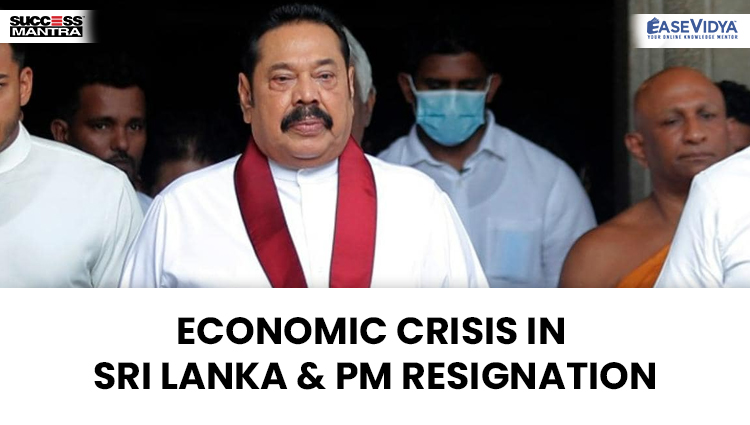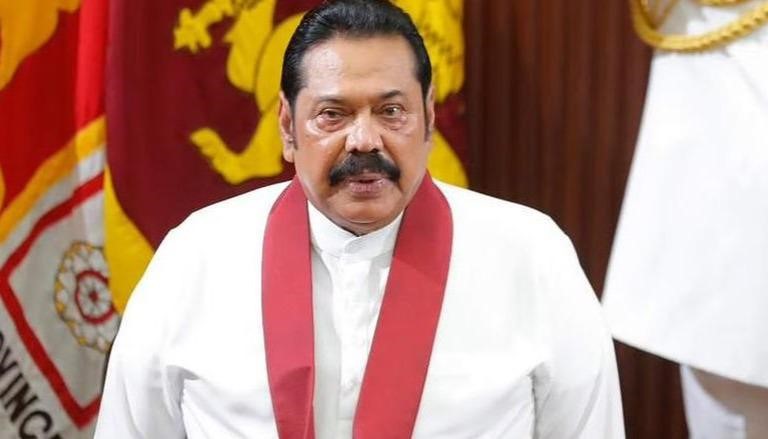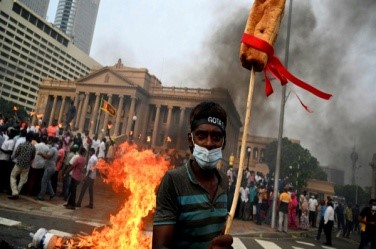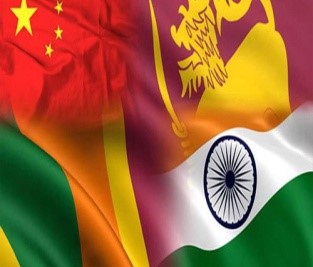
ECONOMIC CRISIS IN SRI LANKA & PM RESIGNATION
ECONOMIC CRISIS IN SRI LANKA & PM RESIGNATION
Recently, the Sri Lankan Prime Minister (PM) Mahinda Rajapaksa tendered his resignation as Prime Minister to the Sri Lankan President. Amid the economic crisis and intensified protests and violence, Sri Lankan citizens have been demanding the resignation of the Prime Minister. Also, Sri Lankan President Gotabaya Rajapaksa wanted the Prime Minister to resign, as it will enable him to form an interim government and pave the way for a solution to the present crisis in Sri Lanka. Mahinda Rajapaksa also served as a President. During his term, Sri Lanka witnessed the defeat of Tamil Tiger rebels in 2009. His term is marked by allegations of corruption, human rights abuses, and nexus with China, which led the country into a debt trap. The Sri Lankan cabinet will be dissolved and a new Prime minister will be selected. A unity government with the Opposition can be formed by the President. The Parliament may be dissolved and fresh elections can be conducted for the Parliament. A national council appointed by the President will select the new prime minister and Cabinet comprising all parties in the Sri Lankan Parliament. The President can dissolve the Parliament. But as per the constitution of Sri Lanka, the president cannot dissolve parliament until midway through its five-year term (until February 2023). To dissolve the parliament before February 2023, the parliament has to pass a resolution.

RANIL WICKREMESINGHE AS 26TH PM OF SRI LANKA
On 12th May 2022, Ranil Wickremesinghe was sworn in as the 26th prime minister of Sri Lanka. He was sworn in as the PM to steady the nation’s economy which is debt-ridden and to end the ongoing political turmoil. The United National Party’s head is Ranil Wickremesinghe. This party is the current main opposition party in Sri Lanka. Ranil Wickremesinghe had already served as the nation’s Prime Minister four times and this will be his fifth time in office.
Current Affairs Notes By Success Mantra Coaching Institute GTB Nagar Delhi CLICK HERE
ONGOING ECONOMIC CRISIS IN SRI-LANKA
The Sri Lankan economy has been facing a crisis owing to a serious Balance of Payments (BoP) problem. Its foreign exchange reserves are depleting rapidly and it is becoming increasingly difficult for the country to import essential consumption goods. The current Sri Lankan economic crisis is the product of the historical imbalances in the economic structure, the International Monetary Fund (IMF)’s loan-related conditionalities and the misguided policies of authoritarian rulers.

WHY IS SRI LANKA SUFFERING FROM CRISIS?
When Sri Lanka emerged from a 26-year long civil war in 2009, its post-war GDP growth was reasonably high at 8-9% per annum till 2012. However, its average GDP growth rate almost halved after 2013 as global commodity prices fell, exports slowed down and imports rose. Sri Lanka’s budget deficits were high during the war and the global financial crisis of 2008 drained its forex reserves which led to the country borrowing a $2.6 billion loan from the IMF in 2009. It again approached the IMF in 2016 for another US$1.5 billion loan; however the conditionalities of the IMF further deteriorated Sri Lanka’s economic health.
Recent Economic Shocks: The Easter bomb blasts of April 2019 in churches in Colombo resulting in 253 casualties, consequently, dropped the number of tourists sharply leading to a decline in foreign exchange reserves. The newly led government by Gotabaya Rajapaksa in 2019 promised lower tax rates and wide-ranging SoPs for farmers during their campaign. The quick implementation of these ill-advised promises further exacerbated the problem. The Covid-19 pandemic in 2020 made the bad situation worse - Exports of tea, rubber, spices and garments suffered. Tourism arrivals and revenues fell further. Due to a rise in government expenditures, the fiscal deficit exceeded 10% in 2020-21, and the debt to GDP ratio rose from 94% in 2019 to 119% in 2021.
Sri Lanka’s Fertiliser Ban: In 2021, all fertiliser imports were completely banned and it was declared that Sri Lanka would become a 100% organic farming nation overnight. This overnight shift to organic fertilisers heavily impacted food production. Consequently, the Sri Lankan President declared an economic emergency to contain rising food prices, a depreciating currency, and rapidly depleting forex reserves.
RECENT ISSUES IN INDIA- SRI LANKA RELATIONS
Killing of Fishermen: Killing of Indian fishermen by the Sri Lankan Navy is a lingering issue between these two nations. In 2019 and 2020, a total of 284 Indian fishermen were arrested and a total of 53 Indian boats were confiscated by the Sri Lankan authorities.
East Coast Terminal project: This year (2021) Sri Lanka cancelled an MoU signed with India and Japan for the East Coast Terminal project. India protested the cancellation though it later agreed to the West Coast Terminal being developed by the Adani group.
Influence of China: China’s rapidly growing economic footprint (and political clout as a corollary) in Sri Lanka is straining India-Sri Lanka relations. China is already the largest investor in Sri Lanka, accounting for 23.6% of the total Foreign Direct Investment (FDI) during 2010-2019 as against 10.4% from India. China is also one of the largest export destinations for Sri Lankan goods and holds over 10% of its external debt.
13th Amendment of the Sri Lankan Constitution: It envisages devolution of necessary powers to the provincial councils to address the just demand of the Tamil people for equality, justice, peace, and respect within a united Sri Lanka.

INDIA-SRI LANKA RELATIONSHIP
- Background: India-Sri Lanka relationship is more than 2,500 years old and both sides have built upon a legacy of intellectual, cultural, religious and linguistic intercourse.
- Support against Terrorism: During the course of the civil war, India supported the right of the Government of Sri Lanka to act against terrorist forces.
- Support for Rehabilitation: The Indian Housing Project is Government of India’s flagship project of developmental assistance to Sri Lanka. Its initial commitment is to build 50,000 houses for those affected by the civil war as well as for the estate workers in the plantation areas.
- Assistance during Covid-19: The Reserve Bank of India (RBI) had signed an agreement for extending a USD 400 million currency swap facility to Sri Lanka to boost the foreign reserves and ensure financial stability of the country, which was badly hit by Covid 19 pandemic. Recently, India has also supplied Covid-19 Vaccines to Sri Lanka.
- Joint Exercises: India and Sri Lanka conduct joint Military (Mitra Shakti) and Naval exercise (SLINEX).
- Participation in Groupings: Sri Lanka is also a member of groupings like BIMSTEC (Bay of Bengal Initiative for Multi-Sectoral Technical and Economic Cooperation) and SAARC in which India plays a leading role.
PRAVAHINI Current Affairs Notes By Success Mantra Coaching Institute GTB Nagar Delhi CLICK HERE
TEST YOURSELF
Q.1 Which of the following has been appointed as the 26th Prime Minister of Sri Lanka after the resignation of Mahinda Rajapaksa?
- Gotabaya Rajapaksa
- Maithripala Sirisena
- Ranil Wickremesinghe: ANSWER
- None of the above-mentioned
Q.2 Which of the following is the joint military exercise conducted between India & Sri Lanka?
- Mitra Shakti Exercise: ANSWER
- Yudh Abhyas Exercise
- Sampriti Exercise
- None of the following
Q.3 India has signed an agreement extending a USD 100 million Line of Credit (LOC) to Sri Lanka for projects in the Solar Energy Sector. The agreement was signed between the Government of Sri Lanka and the ___________?
- Industrial Finance Corporation of India Ltd
- Export Credit Guarantee Corporation of India
- Export-Import Bank of India: ANSWER
- None of the following
Q.4 Consider the given statements & state which of the following is/are correct in the context of the International Solar Alliance (ISA)?
- International Solar Alliance (ISA) was launched by the Prime Minister of India along with the President of France & Prime Minister of Israel.
- It was launched on the side-lines of the United Nations Climate Change Conference of the Parties (COP-21), with 121 solar resource rich countries.
- 89 countries have signed the ISA framework agreement whose vision is to enable One World, One Sun, One Grid (OSOWOG).
- I & II follows
- Only III follows
- II & III follows: ANSWER
- None of the above
Q.5 Both India & Sri Lanka have many common interests & they are the members of the same Organisation. Which of the following is not one of them?
- Bay of Bengal Initiative for Multi-Sectoral Technical and Economic Cooperation (BIMSTEC)
- South Asian Association for Regional Cooperation (SAARC)
- Association of South-East Asian Nations (ASEAN): ANSWER
- None of the above












0 Comment